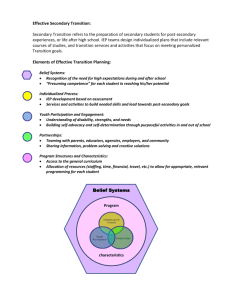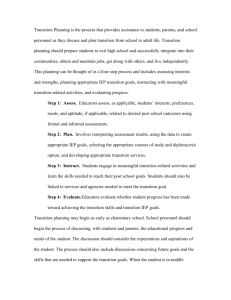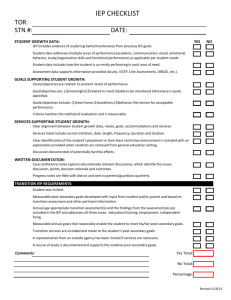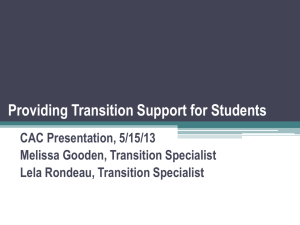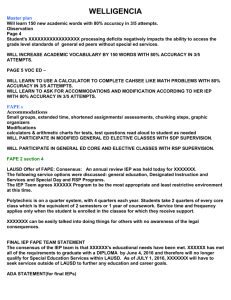DOTS Informational Brochure (English)
advertisement
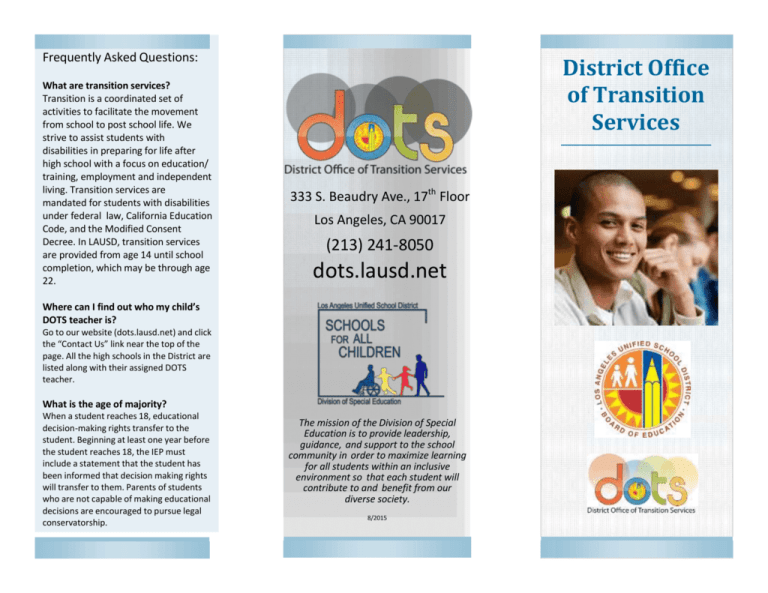
Frequently Asked Questions: What are transition services? Transition is a coordinated set of activities to facilitate the movement from school to post school life. We strive to assist students with disabilities in preparing for life after high school with a focus on education/ training, employment and independent living. Transition services are mandated for students with disabilities under federal law, California Education Code, and the Modified Consent Decree. In LAUSD, transition services are provided from age 14 until school completion, which may be through age 22. District Office of Transition Services 333 S. Beaudry Ave., 17th Floor Los Angeles, CA 90017 (213) 241-8050 dots.lausd.net Where can I find out who my child’s DOTS teacher is? Go to our website (dots.lausd.net) and click the “Contact Us” link near the top of the page. All the high schools in the District are listed along with their assigned DOTS teacher. What is the age of majority? When a student reaches 18, educational decision-making rights transfer to the student. Beginning at least one year before the student reaches 18, the IEP must include a statement that the student has been informed that decision making rights will transfer to them. Parents of students who are not capable of making educational decisions are encouraged to pursue legal conservatorship. The mission of the Division of Special Education is to provide leadership, guidance, and support to the school community in order to maximize learning for all students within an inclusive environment so that each student will contribute to and benefit from our diverse society. 8/2015 Diplomas & Certificates of Completion The District Office of Transition Services (DOTS) is a part of the Division of Special Education with the Los Angeles Unified School District (LAUSD). DOTS focuses on the transition from high school to successful adult living for students with disabilities. Transition Services May Include: Lessons/activities on preparing for post-secondary education, employment or independent living Facilitating connections to local agencies that provide assistance in post-secondary life Participation in work-based learning activities including volunteer work, assistance with obtaining competitive work, or paid training Career and/or college awareness activities Mentoring Instruction/support in self-advocacy skills Assessment in interests and aptitude Other services tailored to student needs to adequately prepare them for adulthood Family Matters! Families can play a huge role in facilitating a successful transition for their son or daughter. Here are some suggestions: In order to earn a diploma, a student must earn credits in the required course of study set by the Board of Education. Students who earn a diploma have completed their high school education and are no longer eligible for special education and related services. Students with an IEP earn a certificate of completion by meeting any one of the following conditions: Satisfactory completion of a prescribed alternative course of study as identified on the student’s IEP; or Satisfactory achievement of his/her IEP goals and objectives during high school as determined by the IEP team; or Satisfactory high school attendance, participation in the instruction prescribed in his /her IEP, and achievement of the transition goals and objectives. Students earning a certificate may continue to pursue a diploma and are eligible to receive special education services up to age 22. Students who earn either a certificate or diploma are eligible to participate in one graduation ceremony as well as school activities related to graduation in which students of similar age without disabilities would be eligible to participate. - It’s never too early to begin building independence. Even elementary school students can be given chores or parts of chores to assist with. - Research indicates that inclusion in the general education setting leads to better post-secondary outcomes. Seek to maximize opportunities in and out of school for your child to spend time with non-disabled peers. - Consider every service your child receives through a transition lens. The entire school journey should be preparing your child for maximum independence rather than increased reliance on supports that are often not provided after high school. - Encourage your child to participate in their annual IEP, learn about their disability, and articulate their wants and needs.

